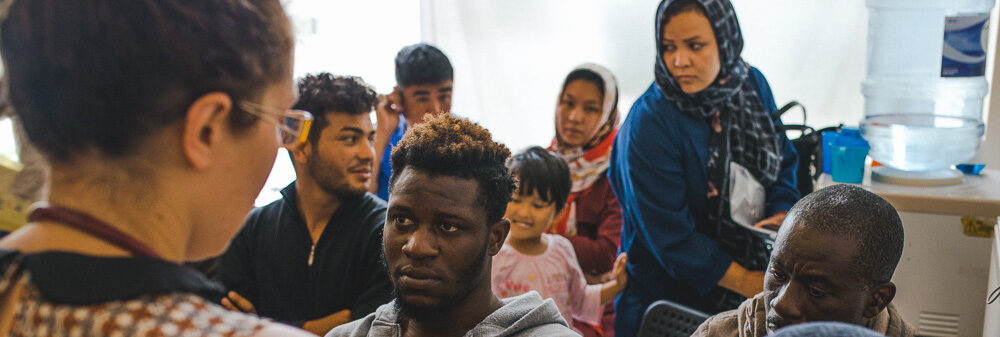Recognised refugees in Greece face insurmountable obstacles when trying to exercise their right to family reunification with their close family members. This is despite the fact that family reunification pathways for refugees constitute a legal obligation for Member States like Greece, to ensure that protected families are able to reconstruct links with their relatives, often broken by their forced exile and displacement.
Major obstacles faced by applicants to family reunification in Greece include the strict and inflexible requirements imposed by the Greek Asylum Services to process applications, that are completely disconnected from the reality of the families of recognised refugees, leaving applicants in dead-end situations without any alternatives. These include for instance the requirement for family members abroad to submit certified copies of their identity documents, travel documents and documents proving the family links, such as family booklets. Such certification is to be carried out by Greek consular services abroad, which are, however, not present or are inaccessible in many of the countries of residence of applicants’ family members (such as in Afghanistan, Sierra Leone, Palestine, Sudan, Burundi, Bangladesh, etc.). This situation forces applicants’ family members to contact and potentially take personal risks in travelling to countries in order to access Greek consular services, which in many cases is impossible due to lack of appropriate travel permits. Additionally, in these instances, consular services in neighbouring countries often do not respond to such requests or declare that they are unable to handle such requests. Such practices are thus in fact impeding people from completing their application, delaying or blocking the progression of family reunification procedures. While these obstacles are due to shortcomings of the responsible Greek authorities, applicants and their family members are not presented with any realistic alternatives, such as consular assistance, remote application procedures or the issuance of travel documents for applicants to travel to countries with Greek consular services.
The undersigned organisations wish to emphasise the particularly dire situation of people in Gaza, who have family members that are recognised as refugees in Greece. Though legally entitled to be reunited in Greece, these families are absolutely unable to exercise their rights. Due to the decade-long Israeli blockade of Gaza, exacerbated by the current Israeli assault, family members who are trapped in Gaza have no way to apply for family reunification to Greece. There are no Greek consular services available in Gaza, yet people are unable to leave. Furthermore, people cannot reach Greek consular services elsewhere, in order to obtain the necessary documents to apply for a family reunification visa to Greece. We therefore urge Greece to follow the lead of countries such as Belgium and provide consular assistance and humanitarian solutions for the safe and legal evacuation from Gaza of the family members of Palestinian refugees in Greece.
The absence of safe and legal pathways accessible for refugees in Greece and their relatives to exercise their right to family reunification is in contravention of Greek law, namely Presidential Decree (PD) 131/2006 as supplemented by PD 167/2008 and amended by PD 113/2013, transposing the European Directive 2003/86/EC on the right to family reunification. It also results in flagrant violations of the fundamental right to private and family life, enshrined in Article 21 of the Greek Constitution, Article 8 of the European Convention on Human Rights (ECHR), Article 7 of the European Union Charter of Fundamental Rights and Article 16 of the Universal Declaration of Human Rights, as well as established case law by the European Court of Human Rights’ and the European Court of Justice in application of the European Directive 2003/86/EC.
When relatives wishing to reunify with their loved ones are minor children, the absence of legal pathways to be able to exercise their rights in Greece also infringes Articles 9 and 10 of the UN Convention on the Rights of the Child, as well as Articles 7 and 24, paragraphs 2 and 3, of the Charter of Fundamental Rights of the European Union, which require Member States to examine applications for family reunification in the best interests of the children concerned and with a view to promoting family life.
The Greek state is currently failing to protect the family life of refugees, and denying refugees their access to civil and humanitarian standards conferred by their international protection status under the Geneva Convention. The reunification of relatives is known to decrease dependence on state support and foster self sufficiency, it should therefore be within Greece’s own interest to facilitate the reunification of families. Notwithstanding this, the Greek government must fulfil its legal obligation to ensure that beneficiaries of international protection have effective access to family reunification procedures, wherever their relatives currently reside.
In particular, we urge the Greek authorities: the Ministry of Migration and Asylum, the Ministry of Interior, and the Ministry of Foreign Affairs, to implement immediate measures in order to facilitate the submission and completion of family reunification procedures to Greece, to reduce the time that families are separated.
These measures should include:
– The simplification and easing of documentation and certification requirements currently required by the Greek Asylum Service and Greek consular services abroad as part of the visa applications, with an understanding of the differing contexts in which the family members of recognised refugees in Greece are living.
– The implementation of alternative solutions, including remote procedures, to facilitate the processing of applications for family reunification in cases where it is impossible to reach Greek consular services
– The compliance of Greece with the requirements of established and binding case law of the CJEU, in particular of the Afrin’s decision of 18 April 2023, stating that Member States should facilitate, rather than block the submission of family reunification application
Moreover, we urge the Ministry of Foreign Affairs and the Greek diplomatic representatives in Israel and Egypt to take into due consideration the extraordinary circumstances faced by Palestinian refugees with family members in Gaza, and take immediate actions to lift procedural barriers and secure their access to family reunion, as other States have already done, including by:
– Providing efficient consular assistance for the family members of recognised Palestinian refugees in Greece, who have family members in Gaza.
– Lifting the requirement to appear in person at consular services for the above individuals given the current situation in Gaza.
Picture: “Family reunification is my right”, in a 2021 protest in Gaza, Palestine supporting the right to family reunification. Credits: Abdallah al-Naami, The Electronic Intifada
Signatories
- Equal Legal Aid
- Fenix Humanitarian Legal Aid
- Human Rights Legal Project
- I Have Rights
- Inter Alia
- Lighthouse Relief
- Legal Centre Lesvos
- Lesvos Solidarity (LESOL)
- Mobile Info Team (MIT)
- Network for Children’s Rights
- Northern Lights Aid
- Refugee Legal Support (RLS)
- Safe Passage International AMKE
- Θάλασσα Αλληλεγγύης – Thalassa of Solidarity
- Yoga and Sport with Refugees


